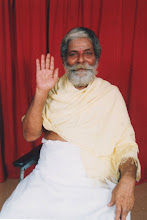The Lord, with all the emphasis at his command, is declaring, once and for all, the final conclusions that were arrived at by the Immortal Sages of yore regarding the place of right-action in Self re-discovery. Without performance of action, the renunciation of action is impossible; without having a thing we cannot renounce it; to renounce life and the world, because one has sadly been thwarted in one's hopes and ambitions, is not renunciation.
In this sense, the polishing of the mind is a process very similar to that by which we clean metal-ware by using metal-polish. The item that is darkened by time is purified by applying some polishing chemical on its surface. The polish is the solvent of the oxide that is covering the brilliance of the vessel. After a time, when we remove the coating of the "polish," we find that not only is the chemical-polish removed but the black oxide also is removed, threreby leaving the vessel bright and attractive.
Similarly, the mind can be purified only by the process of treating it with right action. When thus treated, the mind gets purified from its vasana-blemishes and with such a purified mind alone can we, during the deeper meditation hours, come to renounce all activities. Before this preparation, if we try to renounce activities, we may remain physically inactive, but mentally very active. Extrovertedness of the mind is not conducive to the inner polishing. In fact, extrovertedness is the very mud that sullies the Godly-beauty and strength of the mind. This is the greatest discovery that Hindu Masters made in the ancient days, in the technique of Self-development and Self-growth.
While mental purity and meditative power cannot be gained without performance of right action with the right mental attitude, Sri Krishna gives a positive assurance here that such a conducive mental quality can be created by right actions undertaken by the seekers.
Yoga Yuktah --- One who is well established in the path of selfless and unattached activities, soon develops the qualities of poise and single-pointedness of mind. Karma fulfils itself in making the Yogin fit for continuous and fruitful meditation, and when such an individual who has practised the Path of Karma diligently --- either through the renunciation of his sense of agency or through detachment from all his over-anxious preoccupations with the fruits of his actions --- such a meditator (Muni) soon attains the Supreme experience of theSelf in himself.
No definite time-limit can be fixed for declaring when exactly the Supreme experience will come to a meditator. The indecision regarding the time-element in this promise of certainty is very well brought out by the term used, 'Na-chirena' --- not long afterwards, meaning 'ere-long.'
With this knowledge in mind, when we read the stanza, it becomes very clear why earlier (V-2) the Lord, in his opening verse in this discourse, insisted that for Arjuna 'performance-of-action' is superior to the 'renunciation-of-action.'





No comments:
Post a Comment